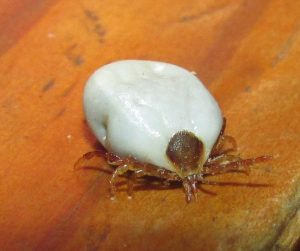Journalism powerhouse and long-time Northern Beaches resident Tracey Spicer has a lot of important things to tell the world: reflecting on where it’s at and where it is heading. But today she asks locals to focus on their own backyard, and to the ever-present threat of ticks to our pets.
With tick season now in full swing, it’s vital you’re providing adequate tick-prevention treatment for your pet and also scanning meticulously for ticks hiding in fur.
Around a decade ago Tracey and her family lost their seven-year-old beloved border collie, Tessa, due to ticks. Tracey came home with the kids, Taj and Grace, and found her dead on the back deck.
The kids were incredibly distressed. They kept up with her tick treatments and inspected her regularly, but she still died.
Then a few years ago, they had a close call with their border collie, Arabella who was five at the time.

Tracey’s mother-in-law was looking after the kids, when they realised Arabella was dragging her back legs behind her.
They took her straight to a vet, who put her under anaesthetic for a life-or-death operation.
Fortunately, Arabella survived. Tracey believes that “even if you’re vigilant, it’s difficult to find the ticks on really furry dogs, like border collies.”
Ticks are a major problem for both humans and animals on the Northern Beaches; bites can cause debilitating meat allergies in some humans and a single bite can kill even the largest dog.
That’s why it’s so important to get things right with tick treatment as we enter into ‘tick season’ on the Northern Beaches.
Veterinarian Dr Evan Shaw says too many dogs and cats are unnecessarily dying from parasites they could easily be protected from.

“Pet owners simply forget to give their pet’s parasite prevention or they are wrongly led to believe one product will cover everything when in actual fact, it doesn’t,” said Dr Shaw.
“Some products are given every six months, but weight gain from puppy/kitten to adult can lead to wildly insufficient dosages of parasite treatment leaving pets vulnerable and at risk of dying,” he said.
“Paralysis ticks are one of the biggest killers of animals with over 20,000 dogs admitted to vet hospitals each year on Australia’s east coast as a result of paralysis ticks and around 5,000 lose their lives.”
“There are over 100 different products on the market to treat a wide range of parasites and no one product in Australia will cover everything, regardless of what they’ll tell you on TV.”
Dr Evan was diagnosed with multiple sclerosis forcing him to retire from vet surgery, but this led him to create a subscription-based mail order flea, tick and worming program specific to a pets needs and delivered to your front door when you need to administer it to your pet, for less than going to a pet store or clinic.
“At the time I was also fostering a puppy called Sirius who I rehabilitated for six weeks and was adopted by wonderful people who I reminded to buy parasite medication – they ended up forgetting, as many pet owners do, and we had to put him down two weeks later because he had very advanced paralysis from a tick.”
“It was at that moment I thought about how many other people lose track of their pet’s health and so Fleamail was born.”

So if you haven’t already, make sure to check in with your vet to ensure you have the best coverage for your pet, or look into Fleamail and see if that’s the option for you.
And don’t forget to check yourself regularly, too!
For more info about local ticks visit Council’s website.
Most of this information has been provided from the Fleamail team. Please note we have no affiliation with fleamail and this is not sponsored content – we just think it’s an important message and a great idea.
Tick tips
Your dog acts strange.
After a tick bite, especially a paralysis tick your dog may show symptoms of weakness or not wanting to play like normal, no appetite, unusual panting and a “funny” cough or bark. If you notice any of these signs, please see a vet.
The “wobbles.”
The toxin’s effects progress from the tail towards the head so you might also notice what looks like your pet is a little “drunk” in their hind legs and an inability to raise their tail like normal.
Excessively licking and drooling.
While ticks are often in places where dogs can’t reach easily, your dog may excessively lick if it knows it has a tick and have a wet muzzle from excessive drooling. Pay close to attention if your dog keeps licking one, or a few spots. Common areas are your dog’s ears, groin or under their front legs.
Unusual scabs or skin irritations.
A tick may have had its fill and left your dog already, however the signs are often still there. Many dogs excessively nip or lick at the bite site. If you notice this behaviour or find scabs on your dog’s body, make sure to conduct a closer examination.
Check over your pet : Run your hands over your pet and feel for a small bump that could vary from the size of a small pebble to a pea. If you feel any abnormality, grab the torch and get as good a look as you can. You can’t miss a tick when you find one.
Keep the tick for identification.
Once you’ve removed it, keep the tick in a jar or zip lock bag so you can get it identified by your vet if need be. If you notice any signs in your pet, or are the least bit concerned, please contact your local vet straight away.



